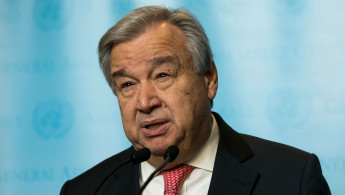UN chief taps British mediator as new Yemen envoy
UN Secretary General Antonio Guterres has tapped mediator and former aid official Martin Griffiths of Britain to be the next peace negotiator for Yemen, taking up a mission that two UN envoys have quit in frustration, diplomats said Wednesday.
Griffiths would replace Ismail Ould Cheikh Ahmed of Mauritania who failed to make headway in UN efforts to end the war between the Saudi-led coalition supporting Yemen's government and Iran-backed Houthi rebels.
Cheikh Ahmed this week told the United Nations that he did not want to continue as special envoy once his contract ends next month.
His predecessor, Jamal Benomar, also quit in April 2015 after four years of efforts to establish a political transition in Yemen fell apart. A month earlier, the coalition began airstrikes in Yemen.
Diplomats said Guterres had told permanent Security Council members — Britain, France, China, the United States and Russia — that Griffiths was his choice and was also consulting with Gulf countries among others.
The UN chief has yet to formally advise the full council of the appointment.
Griffiths is the executive director of the Brussels-based European Institute of Peace and also helped create the Centre for Humanitarian Dialogue in Geneva which specialises in political dialogue.
A former British diplomat, Griffiths was a mediation adviser to Kofi Annan during his Syria mission and also served as humanitarian coordinator for the Great Lakes region in the 1990s.
In 1994, he was appointed director of UN humanitarian affairs in Geneva and later became deputy to the UN emergency relief coordinator in New York in 1998.
The United Nations has listed Yemen as the world's number one humanitarian crisis, with 60 per cent of the population - 17 million people - in need of food, seven million of whom are at risk of famine.
A severe outbreak of cholera has left 2,000 dead and one million infected, according to the International Committee of the Red Cross.





 Follow the Middle East's top stories in English at The New Arab on Google News
Follow the Middle East's top stories in English at The New Arab on Google News
![Israeli forces ordered bombed Gaza's Jabalia, ordering residents to leave [Getty]](/sites/default/files/styles/image_330x185/public/2176418030.jpeg?h=a5f2f23a&itok=_YGZaP1z)

